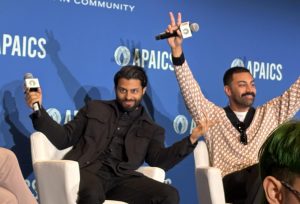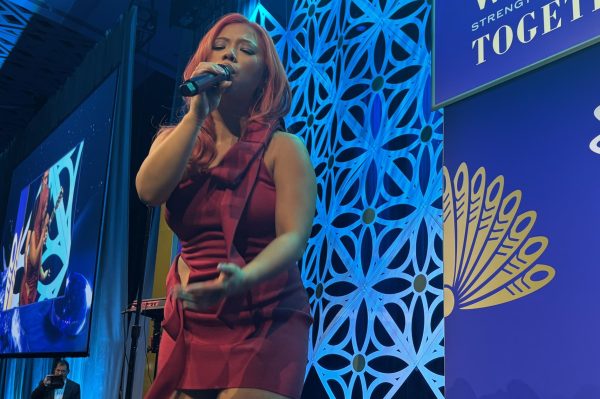FIRST PERSON REPORT
Hundreds of Asian American, Native Hawaiian and Pacific Islanders (AANHPI), from all over the nation and territories gathered in Washington D.C. to participate in the convention, Woven Together: Strength in Community, by the Asian Pacific American Institute for Congressional Studies (APAICS) Monday and Tuesday. Though most attendees were college students and adults, even as a high school student, I understood and enjoyed basking in the presence of such amazing AANHPIs through networking and listening to inspirational panelists. Here are the most memorable moments of the two-day convention.
One of the first sessions had an exciting roster of panelists: fashion and lifestyle content creator Alex Nguyen, political strategist Annie Wu Henry, content strategist and journalist Cary Chow and former Executive Director of the White House Initiative on Asian Americans and Pacific Islanders, Tina Wei Smith. The panel was led by Sam Hyun, Director of Government Relations from The Asian American Foundation. They spoke about the importance of AANHPI representation.
Cary Chow shared an analogy about “the frog at the bottom of the well” that will forever stick with me. Though originally used to describe someone as arrogant and narrow minded, Chow took an inspirational approach, connecting it to good representation. Briefly, the Chinese proverb is about a frog at the bottom of the well who believes the sky is as big as the hole at the entrance of the well. What we see is what we believe. Being able to see a familiar face on TV or on a poster can open doors and inspire younger generations.

The celebrities of the day, Saagar Shaikh and Asif Ali, joined us for lunch. Shaikh and Ali came to promote their series, Deli Boys, where they play two spoiled brothers suddenly thrown into a life of crime after their father dies. Branching off the session above, Shaikh and Ali hilariously talk about how Deli Boys is an example of good representation.
Deli Boys is gory, violent, funny and veers away from the usual representation of South Asians. “Dumb Asians exist too,” Ali said, which many laughed at because it was a jab at the model minority myth.
The theme of representation showed up repeatedly, even in the military. In another fireside chat, I heard from veterans, Vineet Nahta, a former Major with 20 years of experience, Lorna Mae Devera, former U.S. Navy Public Affairs Officer, retired U.S. Army Major General Tony Taguba, Asian Pacific American Public Affairs DC ambassador Stephan DeGuzman and former air force pilot and Assistant Secretary of the Air Force Ravi Chaudhry.

A short film showed about how AANHPIs service to the U.S. dates all the way back to the War of 1812, where at least one Filipino American served.
In the first panel, Wei Smith recalls the one paragraph blurb in a thousand page history book about Chinese Americans’ significant contributions to the continental railroad. However, the sessions were all about how AANHPIs service to the U.S. did not start and end with the Chinese and the continental railroad, but has been around since nearly the beginning of this country and is ongoing.
Day two of the convention was half as long as the first day.
The main room of the convention center filled up to listen to Senator Tammy Duckworth and recently elected Senator Andy Kim, two prominent AANHPI voices at the Capitol, led by NBC News anchor and correspondent Vicky Nguyen, who received an award at the APAICS gala. They spoke about how to move forward within the current political climate. Senator Kim ended the session with some advice on civic engagement. “Show up, push yourself, and lead with grace,” he said.
The APAICS Gala
Sarees, ao dais, hanboks, baros and sayas and more, dripping in traditional clothing, convention attendees made their way to the gala for dinner, closing off the two-day convention. Many dubbed it the “Asian prom.”
The audience heard from a number of speakers, including U.S. Representative Hakeem Jeffries and Representative Judy Chu. APAICS fellows were honored and awards were presented to changemakers, such as Krystal Ka’ai Hetherington, the first Native Hawaiian to serve as Executive Director of the White House Initiative and President’s Advisory Commission on AANHPIs, Lieutenant Colonel Kamal S. Kalsi who is the first “Sikh American in decades to receive a religious accommodation” and advocates for greater religious inclusion in the military, Susan Jin Davis, and the Asian and Pacific Islander American Health Forum.

The night ended as people crowded the front of the stage to party with Vietnamese American pop singer Thuy.
Like Cary Chow’s “frog in the well” analogy, this trip has opened up my sky. Meeting and hearing from such influential Asian Americans and Pacific Islander who advocate for our basic civil rights, elevating the visibility of the AANHPI community has inspired me to apply what I learned to my daily life and my local community. Seeing so many AANHPIs gather and the work that goes on behind the scenes, it reminded me to be proud of my heritage and my community, for we are a significant part of the American tapestry.